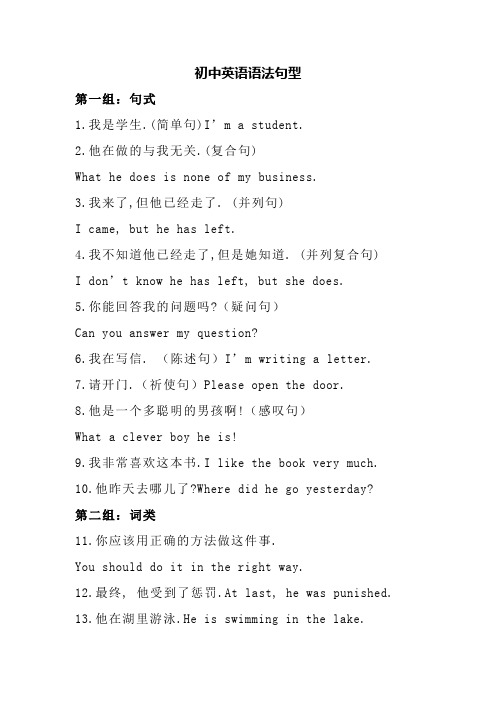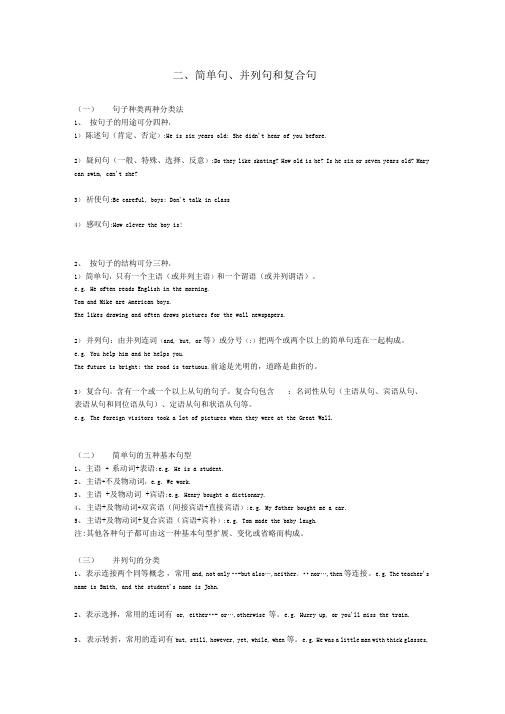初中英语简单句、并列句、复合句
初中英语语法句型

初中英语语法句型第一组:句式1.我是学生.(简单句)I’m a student.2.他在做的与我无关.(复合句)What he does is none of my business.3.我来了,但他已经走了. (并列句)I came, but he has left.4.我不知道他已经走了,但是她知道. (并列复合句)I don’t know he has left, but she does.5.你能回答我的问题吗?(疑问句)Can you answer my question?6.我在写信. (陈述句)I’m writing a letter.7.请开门.(祈使句)Please open the door.8.他是一个多聪明的男孩啊!(感叹句)What a clever boy he is!9.我非常喜欢这本书.I like the book very much.10.他昨天去哪儿了?Where did he go yesterday?第二组:词类11.你应该用正确的方法做这件事.You should do it in the right way.12.最终, 他受到了惩罚.At last, he was punished.13.他在湖里游泳.He is swimming in the lake.14.至今,我已经读了100部小说.So far, I have read 100 novels.15.我不喜欢这乐曲.I don’t like the music.16.你喜欢音乐吗?Do you like music?17.如果我是你, 我会跟他在一起.If I were you, I would stay with him.18.面对困难,一定要保持冷静.When facing difficulty, you should keep calm.19.最终,他梦想成真.At last, his dream came true.20.你所说的听起来很有道理.What you says sounds reasonable.第三组:词类21.我无法容忍你那样对母亲说话.I can’t have you speaking to mum that way.22.我看见他上学去了.I saw him going to school.23.他的演讲大大鼓舞了我们.His speech encouraged us greatly.24.使我们惊奇的是你不愿来.What surprised us was that you were unwilling to come.25.军人的天职是执行命令.It is a soldier’s duty to carry out orders.26.摇头意味着不同意. (v-ing作主语)Shaking heads means disagreement.27.将有一个更大的地震袭击这个国家.Another big earthquake will hit this country.28.我同意你所说的.(名词从句作宾语)I agreed with what you said.29. 我后悔告诉了你那件事.(双宾)I regret telling you that.30. 事实是他不相信我们. (名词从句作表语)The fact is that he doesn’t believe us.第四组:句子成分31. 楼上的那家人很外向.(adv 作定语)The family upstairs are outgoing.32. 我认识一个加TOM 的男孩 (过去分词作定语)I know a boy named Tom.33. 在有问题的地方做记号.(从句作状语)Make marks where you have questions.34. 我发现他仰卧在地上(v-ing 作宾补)I found him lying on his back on the ground.35. 他敞着窗睡觉, 醒着. ( adj.作状语)He slept with the window open, awake.36. 我发现他不在家. (adv.作宾补)I found him out.37. 这就是我过去工作过的那家工厂.This is the factory where I used to work.38. 他是一个学生, 一个受学生们欢迎的学生.(同位语—代词)He is a student, one who is popular with the students.39. 我的工作是教英语.(V-ing作表语)My job is teaching English.40. 我去看他却发现他不在家.(不定式作结果状语)I went to see him only to find him out.第五组:句子结构41. 他进来了. (主---谓)He came in.42. 我喜欢英语. (主---谓---宾)I like English.43. 他解决了这道难题.He worked out the difficult problem.44. 我给了他一本书.I gave him a book.45. 我把这些钱借给了他.I lent the money to him.46. 我们选他当班长.We made him our monitor.47. 什么让你那样想?What makes you think that way?48. 我们抓住他偷窃.We caught him stealing.49. 你穿这件外套很好看.You look nice in this coat.50. 这菜味道不错.The dish tastes great.第六组:冠词51. 这只马是动物.The horse is an animal.52. 一只马是动物.A horse is an animal.53. 马都是动物.Horses are animals.54. 我喜欢音乐.I like music.55. 我喜欢这曲音乐.I like the music.56. 请开门.Please open the door.57. 在这里演讲是一种荣幸.It’s an honor to give a speech here.58. 他历史知识丰富.He had a good knowledge of history.59. 在夏天跳进河里游泳是多么有趣啊!What fun it is to jump into the river and swim in summer.60. 汽车正以60公里的速度行使.The car is going at a speed of 60 kilometers an hour. 第七组:名词61. 他做了个竹窗帘. (名词作定语)He made a bamboo curtain.62. 我从学校走回家要10 分钟. (名词所有格)It’s ten minutes’ walk for me to come home from school.63. 这一次他真的犯了错. (固定)He really made a mistake this time.64. 他给我们提供了一些信息.He offered us some information.65. 同学们正在纠正试卷.The students are correcting the papers.66. 是中国最先造纸的.It is China that first made paper.67. 我将去拜访Smith 的家人.I will call on the Smiths.68. 我将去Smith家看看.I will call at the Smith’s.69. 这地图对你很有价值.The map is of great value to you.70. 他英语知识丰富.He has a good knowledge of English.第八组:代词71. 让我们讲清楚, 迟到的人是要受罚的.Let’s make it clear that the one who is late should be punished.72. 是在我工作的那家工厂我遇上他的. (强调)It was in the factory where I worked that I met him. 73. 请大声说, 以便别人能听清楚你.Please speak aloud so that you can make yourself heard.74. 中国人口比日本多.The population of China is much larger than that of Japan.75. 一个石头房子比木头房子坚固.A house of stone is much stronger than one of wood.76. 我们每一个人都应该听老师的话.Every one of us should listen to the teacher.77. 在路大两旁有许多树.There are many trees on both sides of the road. 78. 许多工厂在污水排出之前几乎没有采取措施.Little has been done before polluted water goes into the river from many factories.79. 我有两个妹妹, 一个是老师,而另一个是护士.I have two sisters. One is a teacher while the other is a nurse.80. 她听到一声巨响,这使她震惊不以.She heard a loud noise, which made her frightened. 第九组:形容词,副词81. 我在街上偶然遇到了一个三岁的小孩. (复合adj.)I came across a three-year-old child on the street.82. 这老人独居却不孤独.The old man lives alone but he is not lonely.83. 他进来了, 看起来精神抖擞. (系表)He came in, looking energetic.84. 费了很大力, 他推开了门.He pushed the door open with great strength.85. 他下到深深的井里救我,这使我深为感动.He went deep into the well to save me, which moved me deeply.86. 你这样做太蠢了.It’s so foolish of you to do so.87. 对于我们学英语是必要的.It’s necessary for us to learn English.88. 这个包背起来太重.The bag is too heavy to carry.89. 这个剧院大得可以容纳1000人.The theatre is big enough to seat 1000.90. 他匆匆赶回家,内心充满恐惧.He hurried home, full of fear.第十组:比较级句式91. 这个题太难,我解不出(too … to ).The problem is too difficult for me to work out. 92. 他是这们一位好老师,以致我们都喜欢他(so that ). So good a teacher is he that all of us like him. 93. 在他俩中, Tom 较高.Of the two, Tom is the taller.94. 莎士比亚比任何一个英国其他作家更有名. Shakespeare is more famous than any other writer in the UK.95. 这间房是那间三倍大( as … as ).This house is three times as big as that one.96. 这间房比那间大三倍( than ).This house is three times bigger than that one. 97. 这间房比那间大三倍( the size of )This house is three times the size of that one . 98. 冬眠不只是睡觉( more than ).Hibernation is more than sleep.99. 你跑得不如他快.(not … more than)You are not faster than him.100. 你和他都跑得不快(no … more than)You are no faster than him.第十一组:数词101. 今天他是第十三个到校的(序数词).He was the 13th to come to school today.102. 请把作业送到302房间.Please send the housework to room 302.103. 他毕业于1987年7月7日.He graduated on July 7th in 1989.104. 除了英语和日语,他又学了一门语言,法语.Besides English and Japanese he has learned a third language – French.105. 成千上万的人在地震后无家可归.Thousands of people became homeless after the earthquake.106. 据说他在20世纪晚期在美国读过书.It’s said that he studied in America in the late 20th century.107. 经理将于一.两天后回来.The manager will be back in one or two days.108. 你完成了那篇2000词的文章吧?(复合adj)Have you finished the 2000 – word article?109. 我想买那些黑色鞋中的一双.I want to buy one pair of those black shoes.110. 他50岁时去了北京.He went to Bejing in his fifties.第十二组:主谓一致111. 这些都是目前最畅销的书.(从句主谓一致).These are the books that sell well at present. 112. 中国人口众多,其中80%是农民..China has a large population, of which 80% are peasants.113. 不仅我而且他去过北京。
英语三大句型

英语三大句型
句型是根据句子的结构(句法成分的配置格局)对不同的单句进行分类,从而划分出的类型,英语三种基本句型是:简单句、并列句和复合句。
一、简单句
基本形式:简单句的基本形式是由一个主语加一个谓语构成。
二、并列句
两个及以上的简单句用并列连词连接在一起,这样构成的句子叫做并列句,其基本结构是“简单句+并列连词+简单句”。
并列连词有:and,but,or,so等.并列句中的`各简单句意义同等重要,相互之间没有从属关系,是平行并列的关系。
它们之间用连词连结。
三、复合句
复合句分为并列复合句compound sentence(也称并列句)和主从或从属复合句complex sentence(也称复杂句),并列复合句compound sentence是有并列连词:and、or、but连接;从属复合句complex sentence由一个主句(Principal Clause)和一个或一个以上的从句(Subordinate Clause)构成。
用疑问词作引导词,主句是全句的主体,通常可以独立存在;从句则是一个句子成分,不能独立存在。
从句不能单独成句,但它也有主语部分和谓语部分,就像一个句子一样。
所不同在于,从句须由一个关联词(conjunction)引导。
根据引导从句功能不同,大致可分为:主语从句、表语从句、宾语从句、定语从句、状语从句等。
简单句、并列句和复合句包括五大句型

二、简单句、并列句和复合句(一)句子种类两种分类法1、按句子的用途可分四种:1)陈述句(肯定、否定):He is six years old; She didn't hear of you before.2)疑问句(一般、特殊、选择、反意):Do they like skating? How old is he? Is he six or seven years old? Mary can swim, can't she?3)祈使句:Be careful, boys; Don't talk in class4)感叹句:How clever the boy is!2、按句子的结构可分三种:1)简单句:只有一个主语(或并列主语)和一个谓语(或并列谓语)。
e.g. He often reads English in the morning.Tom and Mike are American boys.She likes drawing and often draws pictures for the wall newspapers.2)并列句:由并列连词(and, but, or等)或分号(;)把两个或两个以上的简单句连在一起构成。
e.g. You help him and he helps you.The future is bright; the road is tortuous.前途是光明的,道路是曲折的。
3)复合句:含有一个或一个以上从句的句子。
复合句包含:名词性从句(主语从句、宾语从句、表语从句和同位语从句)、定语从句和状语从句等。
e.g. The foreign visitors took a lot of pictures when they were at the Great Wall.(二)简单句的五种基本句型1、主语+ 系动词+表语:e.g. He is a student.2、主语+不及物动词:e.g. We work.3、主语 +及物动词 +宾语:e.g. Henry bought a dictionary.4、主语+及物动词+双宾语(间接宾语+直接宾语):e.g. My father bought me a car.5、主语+及物动词+复合宾语(宾语+宾补):e.g. Tom made the baby laugh.注:其他各种句子都可由这一种基本句型扩展、变化或省略而构成。
中考英语讲解:有关简单句、复合句和并列句的知识疏理

中考英语讲解:有关简单句、复合句及并列句的知识疏理1. 简单句:(1)定义:只有一个主语(或并列主语)和一个谓语(或并列谓语)的句子叫简单句,如:We learn English . 我们学英语。
(一个主语和一个谓语)Both Xiao Zhang and Xiao Wang are from Beijing .小张和小王都是北京人。
(一个并列主语和一个谓语)He once lived and worked here .他曾经在这里居住和工作过。
(一个主语和一个并列谓语)My father and mother go to work at seven in the morning and come back home at eight in the evening .我父母早上七点上班,晚上八点回家。
(一个并列主语和一个并列谓语)(2)分类:上次我们对简单句按照句子基本结构分出的5种类型做了阐述;另外,根据句子的功能或使用目的,简单句可分四类:陈述句、疑问句、祈使句、感叹句。
2. 并列句:(1)定义:用并列连接词连接起来的两个或两个以上简单句叫做并列句。
(2)并列句的构成:简单句+连接词+简单句(3)连接并列句常用的连接词:and , but , or , so , not only … but also , however , neither…nor , either…or , still等。
eg.I help her and she helps me . 我帮她,她帮我。
He is very old but he is in good health . 他年纪很大了,但他身体很好。
We must hurry or we’ll be late . 我们得赶快走,不然就晚了。
This girl did her work carefully , so she never made any mistakes .这个姑娘工作认真,从不出差错。
英语五个基本句型

初中英语语法大全:数词根据语法形式,即句子的结构,英语的句子可分为简单句、并列句和复合句。
1简单句句型:主语+谓语只包含一个主谓结构,而句子的各个结构都只由单词或短语表示。
简单句有五种基本句型,详见第十七章。
They are playing baseball in the garden.他们正在公园里打棒球。
Her brother and sister both are teachers.她的哥哥和姐姐都是老师。
2并列句句型:简单句+并列连词+简单句(常见的并列连词有and,but,or)并列句是由两个或两个以上的简单句连接而成。
并列句中的各简单句意义同等重要,相互之间没有从属关系,是平行并列的关系。
它们之间用连词连结。
My friend was at home,and we talked for along time.我的朋友在家,我们谈了好长时间。
Her father is a doctor and her mother is a teacher.她父亲是个医生,她母亲是个老师。
I liked the story very much but Li Ming wasn't interested in it.我非常喜欢这个故事,可是李明却对它不感兴趣。
Hurry up,or you'll be late.快点,否则你就会迟到的。
3 复合句句型:主句+连词+从句;或连词+从句+主句(包含一个主句、一个或一个以上的从句,或只包含一个从句,但有两个或两个以上的主句的句子叫复合句。
)句子的成分组成句子的各个部分叫做句子的成分。
句子成分包括:主语、谓语、表语、宾语(直接宾语、间接宾语)、宾语补足语、定语和状语。
主语和谓语是句子主体部分(在英文中一般的句子必须有主语和谓语)。
表语、宾语和宾语补足语是谓语里的组成部分。
其他成分如定语和状语是句子的次要部分。
下面我们分别讲述一下句子的各个成分:1 主语主语是谓语讲述的对象,表示所说的“是什么”或“是谁”。
初中英语句子结构 五大基本句型

初中英语句子结构五大基本句型在初中英语学习中,句子结构是一个重要的知识点,它是学习英语语法的基础。
句子结构是指句子所包含的各个成分之间的关系和排列顺序。
在英语中,句子结构可以分为五大基本句型,包括简单句、并列句、复合句、疑问句和感叹句。
一、简单句简单句是最基本的句子结构,它由主语和谓语构成,可以含有宾语、表语等成分。
简单句可以表示一个完整的意思,如:1. My friend likes to play basketball.2. The sun shines brightly.3. She is a teacher.在简单句中,主语通常在句子的开头,谓语在主语之后,宾语或表语在谓语之后。
简单句可以用于表达陈述句、祈使句和感叹句。
二、并列句并列句是由两个或多个简单句通过连接词或标点符号连接而成的句子结构。
并列句中的简单句之间是平行的关系,它们的主语和谓语通常是相同的。
如:1. I like swimming, and my sister likes dancing.2. He is a good student, but he is not good at sports.3. She is tall, slim, and beautiful.在并列句中,连接词的种类很多,如and, but, or, so等。
并列句可以用于表达并列关系、转折关系、选择关系和因果关系等。
三、复合句复合句是由一个主句和一个或多个从句组成的句子结构。
从句可以作为主句的主语、宾语、表语或定语。
如:1. I know that you are busy.2. She likes the book which I bought yesterday.3. He is the boy who won the first prize.在复合句中,从句通常由连接词引导,如that, which, who, when, where, why等。
初中英语句子结构分析
初中英语句子结构分析
1.简单句结构:
-主语+谓语
- 例:I like ice cream.(我喜欢冰淇淋。
)
2.并列句结构:
-主句+连词+主句
- 例:I am tired, but I need to finish my homework.(我很累,但我需要完成作业。
)
3.复合句结构:
-主句(主语+谓语)+从句
- 例:I will go to bed early tonight because I have an important test tomorrow.(因为明天我有一场重要的考试,所以今晚我
会早点睡。
)
在复合句中,从句可以是名词性从句、定语从句或状语从句,根据从
句的功能和位置可以有不同的结构。
以下是一些常见的复合句结构:
-名词性从句结构:
- 主句 + 连词 + that/whether/if + 从句
-定语从句结构:
-主句(含有被修饰的名词)+连词+从句(修饰主句中的名词)
- 例:The book that he borrowed from the library is very interesting.(他从图书馆借的那本书非常有趣。
)
-状语从句结构:
-主句+连词+从句(修饰主句的动词、形容词、副词等)
- 例:I will go swimming after I finish my homework.(我完成作业后会去游泳。
)
需要注意的是,英语句子的结构可以根据需要自由组合,可以省略一些成分,也可以添加修饰、插入语等来丰富句子的表达。
初中英语五大基本句型
初中英语五大基本句型初中英语共有五大基本句型,它们是简单句、并列句、复合句、选择疑问句和特殊疑问句。
下面将详细介绍这五种句型及其用法。
1. 简单句(Simple Sentence)简单句由一个主语和一个谓语构成,表达一个完整的叙述意思。
句子中可以有其他成分如宾语和状语等。
例如:- I like cats.(我喜欢猫。
)- She is reading a book.(她在读一本书。
)- We played football yesterday.(我们昨天踢足球。
)2. 并列句(Compound Sentence)并列句由两个或多个简单句通过连词连接而成。
这些简单句相互独立,不依赖于其他句子。
一般使用连词and, but, or等。
例如:- I like to swim, and my brother likes to play basketball.(我喜欢游泳,我弟弟喜欢打篮球。
)- She is studying for her test, but I'm watching TV.(她在为她的考试学习,但是我在看电视。
)- You can choose to go to the beach or stay at home.(你可以选择去海滩还是待在家里。
)3. 复合句(Complex Sentence)复合句由一个主句和一个或多个从句构成。
主句是完整的句子,而从句是一个依附于主句的不完整的句子。
从句可以是名词从句、定语从句或状语从句。
例如:- I know that she is coming to visit us tomorrow.(我知道她明天要来看我们。
)- The book that I borrowed from the library is very interesting.(我从图书馆借的那本书很有趣。
)- We will go to the park if it doesn't rain tomorrow.(如果明天不下雨,我们会去公园。
初中英语简单句、并列句、复合句
初中英语简单句、并列句、复合句XXX语法专题——简单句、并列句简单句:陈述句、感叹句、疑问句、祈使句一、XXXXXX用来陈述一件事情或者表达一种看法,有肯定和否定两种形式,句末通常用句号,读降调。
1、肯定形式:主语+谓语+其他The boy often XXX.2、否定形式:1)be的否定式:be用作系动词时:主语+be+not+表语+其他She is not a XXX.be用作助动词时:主语+be+not+动词的现在分词或过去分词+其他XXX XXX.2)助动词、情态动词的否定3)除not外,其他否定词也可构成否定句:no、never、little、few、no one、nobodynothing、XXX of。
seldom、XXX二、感叹句叹息句是用来表达人的非凡情绪的句子。
1、what引导的感叹句1)What+a/an+形容词+可数名词单数形式+主语+谓语!What a beautiful girl she is!2)What+形容词+可数名词复数形式+主语+谓语!What important jobs they have done!3)What+形容词+不可数名词+主语+谓语!What sweet water it is!2、how引导的感叹句1)How+形容词或副词+主语+谓语!How interesting the dog is!2)How+形容词+a/an+可数名词单数方式+主语+谓语!How useful a subject it is!3)How+主语+谓语!How time flies!3、一些特殊形式1)在陈述句、祈使句或疑问句句尾加叹息号酿成叹息句He runs so fast!2)用一个词或词组表达激烈豪情的句子Wonderful!Look out!Great!3)以there、here等副词开头的叹息句There she is!There goes the bell!三、疑问句用以提问的句子较疑问句,句末用问号。
初中英语句子种类讲解(PPT52张)
newspaper when I
came in. ❖She is the girl who
sings best of all.
定语从 句
❖It is well-known that the 2008 Olympic Games will be held on August 8th.
主语从句
❖As is known to all, the
neither…. nor…. ▪ 转折并列连词: but,while,yet
▪ 因果并列连词: for, so
▪ 选择并列连词: or
请用合适的并列连词把每组句子合
并为一个并列句。 1.He was tired. He went to bed.
He was tired, so he went to bed.
<2>. Do you know what w\as
happened yesterday? (改错)
3. _主__语___+__谓__语__+__宾__语___(_S_+V+O)
We are having an English class.
Mr Wang will attend the lecture.
★高考经常考查的系动词:
<1>. “变得”g_e_t____b,e_c_o__m_e__,
_t_u_r_n___, _g_o_____, _g_r_o_w_...
<2>. “看起来”lo_o__k___s,_e_e_m___,_a_p_p__e_ar “闻起来”s_m__e_ll__ “尝起来”taste
感叹句结构
感叹句通常有what, how引导,表示赞美、惊
- 1、下载文档前请自行甄别文档内容的完整性,平台不提供额外的编辑、内容补充、找答案等附加服务。
- 2、"仅部分预览"的文档,不可在线预览部分如存在完整性等问题,可反馈申请退款(可完整预览的文档不适用该条件!)。
- 3、如文档侵犯您的权益,请联系客服反馈,我们会尽快为您处理(人工客服工作时间:9:00-18:30)。
简单句:陈述句、感叹句、疑问句、祈使句
一、陈述句
陈述句用来陈述一件事情或者表达一种看法,有肯定和否定两种形式,句末通常
用句号,读降调。
1、肯定形式:主语+谓语+其他
The boy often helps others.
2、否定形式:
(1)be的否定式:be用作系动词时:主语+be+not+表语+其他
She is not a teacher.
be用作助动词时:主语+be+not+动词的现在分词或过去
分词+其他Jim isn’t playing football.
(2)助动词、情态动词的否定
(3)除not外,其他否定词也可构成否定句:no、never、little、few、no one、nobody
nothing、neither of....、seldom、too...to
二、感叹句
感叹句是用来表达人的特殊情感的句子。
1、what引导的感叹句
(1)What+a/an+形容词+可数名词单数形式+主语+谓语!What a beautiful girl she is!
(2)What+形容词+可数名词复数形式+主语+谓语!What important jobs they have done!
(3)What+形容词+不可数名词+主语+谓语!What sweet water it is!
2、how引导的感叹句
(1)How+形容词或副词+主语+谓语!How interesting the dog is!
(2)How+形容词+a/an+可数名词单数形式+主语+谓语!How useful a subject it is!
(3)How+主语+谓语!How time flies!
3、一些特殊形式
(1)在陈述句、祈使句或疑问句句尾加感叹号变成感叹句
He runs so fast!
(2)用一个词或词组表达强烈感情的句子
Wonderful! Look out! Great!
(3)以there、here等副词开头的感叹句
There she is! There goes the bell!
三、疑问句
用以提问的句子较疑问句,句末用问号。
疑问句分为一般疑问句、特殊疑问句、选择疑问句和反义疑问句。
1、一般疑问句
表示询问事物或者某种情况是否属实,需要对方给予肯定否定回答。
(1) be+主语+其他?
(2)助动词(情态动词)+主语+谓语(动词原形)+其他?
回答:Yes,主语+be/助动词/情态动词
No,主语+be/助动词/情态动词+not
2、特殊疑问句
用特殊疑问词引导的疑问句叫特殊疑问句。
回答时不能用Yes No
(1)疑问代词:what 、who 、which 、whose(谁的)、whom(宾格谁)
(2)疑问副词:when 、where、why、how
(3)疑问词组:how soon、how long、how far、how soon
3、选择疑问句
提出两个或两个以上的情况,要求对方选择一种情况回答的问句。
(1)一般疑问句+or+被选择部分?
Do you like apples or pears?
(2)特殊疑问句,+A or B?
Which would you like better,tea or coffee?
4、反义疑问句
(1) 陈述部分含有never、few、little、nothing、nobody、no、hardly、none、too...to等表示否定意味的词时,其反义疑问部分应用肯定形式。
There are few people in the room, are there?
(2)陈述部分是There be 结构时,反义疑问句部分用be there
There is a tree in front of the building, isn’t there?
(3)当陈述部分的主语为指人的不定代词时,反义疑问句部分主语用he或者they
Somebody wants to see you ,doesn’t he/don’t they?
(4)当陈述部分的主语为指物的不定代词时,反义疑问句部分主语用it
Something is wrong with your computer, isn’t it ?
(5)当陈述部分的主语为this,that等时,反义疑问句主语用it;陈述部分的主语为these,those 等时,反义疑问句主语用they。
前肯后否,前否后肯。
This is a beautiful picture, isn’t it?
Those aren’t your books, are they?
(6)have /has 的情况
Tom has a new watch, hasn’t/doesn’t he? (有)
Kate has to help her mother at home, doesn’t she? (不得不)
They had a good time in Beijing, didn’t they? (吃,喝,玩,度过)
We had better stop talking, hadn’t we? (最好)
Lucy has ever been to Japan, hasn’t she ? (在完成时中)
(7)need的情况
We need to arrive in Shanghai at 7:00, don’t we ?(行为动词)
We needn’t leave at once, need we ? (情态动词)
(8)must的情况
They must come on time, needn’t they? (必须)
That man must be Lilei ,isn’t he?(表示推测,一定,想必之意)
(9)I am 形式
I’m right,aren’t I ?
(10)祈使句形式
Listen to me carefully,will/won’t you? (肯定形式)
Don’t paly with fire, will you ? (否定形式)
(11)let’s let us开头的祈使句
Let’s go to the park, shall we?
Let us help you ,will you ?
(12)陈述句部分若为主从复合句,反义疑问句部分的主语与主句的主语一致。
She said he would come tomorrow, didn’t she?
四、祈使句
祈使句表示命令、请求、建议或劝告等等。
主语通常被省略,谓语动词用原先,句末用感叹号或句号。
1、(1)肯定祈使句,以动词原形开头(省略主语) Come in! Be quiet!
(2)有时为了加强语气,可以在动词前加do,表示“务必,一定”Do come on time!
2、否定祈使句
Don’t +动词原形
Let’s+not+动词原形
3、有时为了表示委婉语气,可在句末加please,用逗号隔开。
并列句
构成:简单句+并列连词+简单句
分类:表顺延、递进、转折、对比、选择、因果
一、表示顺承、并列、递进关系的连词
and, both.....and, as well as, not noly...but also....,neither....nor...
二、表示转折或对比关系的连词
but, yet(然而),while(而)
三、表示选择关系的连词
Either...or.... 就近原则:动词与靠近它的人称、数保持一致
Or或者,否则
四、表示因果关系的连词
so所以,因此,于是,表示因果关系
for 因为,也表示因果关系
如有侵权请联系告知删除,感谢你们的配合!。
